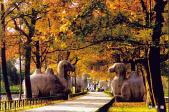 | Zhu Yuanzhang was born in a destitute peasant family in Zhongli (today’s Fengyang, Anhui Province) as the youngest of eight sons. He grew up in great hardship. Because his family did not have enough food, several of his siblings were "given away" by his parents. When he was 16 the Yellow River broke its banks and flooded the lands where his family was living. This was quickly followed by the plague in which his father died, followed shortly by his |
mother and all but one brother. In order to survive, he had to become a novice monk at a local Buddhist monastery, the Huangjue Temple. Zhu did not remain in the monastery for long, as the monastery ran out of money and he was forced to leave. The next few years were hard. He traveled, begged for food, and saw, first-hand, the troubles of the people. After some three years he returned to the monastery and stayed there until he was about 24 years old. During this time with the Buddhist monks he learned to read and write. In later years, while he remained sympathetic to Buddhism, he himself did not become a Buddhist.
Institutionalized ethnic discrimination practiced by Yuan government against Han and a series of natural stirred resentment and rebellion. Consequently, agriculture and the economy were in shambles and rebellion broke out among the hundreds of thousands of peasants called upon to work on repairing the dykes of the Yellow River.
A number of Han groups revolted, including the Red Turbans in 1351. The Red Turbans were affiliated with the White Lotus, a secret Buddhist society. Zhu Yuanzhang joined the Red Turbans in 1352. His talent and ability were widely recognized and then he married the foster daughter of a rebel commander. In 1356, Zhu's rebel force captured the city of Nanjing, which he would later establish as the capital of the Ming Dynasty.
Zhu Yuanzhang cemented his power in the south by eliminating his arch rival and rebel leader Chen Youliang in the Battle of Lake Poyang in 1363. In 1368, Zhu Yuanzhang declared himself emperor in Nanjing, marking the establishment of Ming Dynasty.
In the same year, Zhu sent an army toward the Yuan capital Dadu (today’s Beijing). The last Yuan emperor fled north to Shangdu and Zhu declared the founding of the Ming Dynasty after razing the Yuan palaces in Dadu to the ground. The city was renamed Beiping in the same year.
Unlike all the other emperors, Zhu Yuanzhang worked very hard. He was an enlightened and brilliant emperor who carried out positive policies, which helped China rapidly recovered from chaos in late Yuan Dynasty. His reign created the prosperity in the early Ming Dynasty and laid solid foundation for the long peace of Ming Dynasty.
In order to recover from rule of the Mongols and the wars that followed it, the Emperor Hongwu enacted pro-agricultural policies. The state invested extensively in agricultural canals, reduced taxes on agriculture to 1/30 of the output, and later to 1.5% of agricultural output. Ming farmers also introduced many innovations such as water-powered plows, and new agricultural methods such as crop rotation. This led to a massive agricultural surplus that became the basis of a market economy.
The legal code drawn up in the time of the Hongwu Emperor was considered one of the great achievements of the era. As early as 1364 the monarchy had started to draft a code of laws. This code was known as “Da Ming lü” (“Code of the Great Ming”). Zhu Yuanzhang devoted great personal care to the whole project, and told the ministers that the code of laws should be comprehensive and intelligible, so as not to leave any loophole for lower officials to misinterpret the law through twisting its language. The Ming code laid much emphasis on family relations. The code was a great improvement on the code of the earlier Tang dynasty in regards to the treatment of slaves. Under the Tang code, slaves were treated as a species of domestic animal. If they were killed by a free citizen the law imposed no sanction on the killer. Under the Ming dynasty, however, the law protected both slaves and free citizens.
Zhu Yuanzhang is a great man with outstanding talents and perseverance. He built a great unified and centralized dynasty from nothing. His legendary stories have always been passed down widely through the history. |